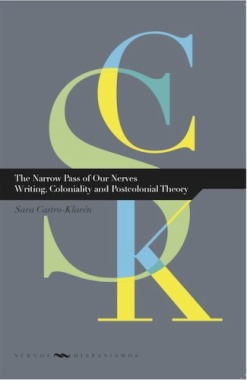The book analyzes, from the perspective of the coloniality of power, the cultural and political work of colonial subjects such el Inca Garcilaso de la Vega, Guaman Poma de Ayala or Sor Juana Inés de la Cruz.
- Cover
- Untitled
- Copyright page
- Table of contents
- Acknowledgements
- Preface
- Part I. Writing coloniality
- Chapter 1. Guamán Poma: Coevalness and the Space of Purity
- I. Writing and Ethnic Identity
- II. Separation and Autonomy
- III. Learning Writing
- IV. Setting up Separate Rule
- V. The Future of Time
- VI. The Space of Purity
- VII. The Organization of Purity and the King’s Advantage
- VIII. The Impossibility of Coevalness
- Chapter 2. Guamán Poma: Confession, Pastoral Power, and the Order of the Subject
- I. The Order of (the) Subject
- II. “Calles” and the Taxonomy of Confession
- III. The Dialogic Order of the Subject
- Chapter 3. Dancing and the Sacred in the Andes: From the Taqui-Oncoy to Rasuñiti
- Chapter 4. Memory and “Writing” in the Andes: From Cuzco to Valladolid and Back Again
- Preamble
- I. Timelines
- II. Spaces of Entanglement
- III. From Valladolid to Cuzco, or How to “Write” the Andean Past and Present
- Chapter 5. Historiography on the Ground: the Toledo Circle and Guamán Poma
- Preamble
- Introduction
- I. The Books of the Brave
- II. On the Pleasure of Tyranny
- III. Governmentality: Ordenanzas and Buen Gobierno
- Conclusions
- Chapter 6. Writing Subalternity: Guamán Poma and Garcilaso, Inca
- Preamble
- I. Writing Interdictions
- II. Evocation in a New Mode
- III. Writing Back in Reciprocity
- Chapter 7. Garcilaso's Cuzco: Space and the Place of Knowledge
- I. Humanism and Renaissance
- II. Cuzco and Humanism
- III. A Problem of Knowledge and Method
- IV. Our Knowledge of Cuzco
- V. The “Plan” of Cuzco
- VI. Cuzco and the Problem of Knowledge
- Chapter 8. Pedagogies Baroque
- I. Sor Juana, Sigüenza y Góngora, and a Question of Method
- II. The Jesuits and the Humanist Paedeia
- III. Pedagogies Baroque
- IV. Bending Pedagogies
- Chapter 9. The Nation in Ruins: Archeology and the Rise of the Nation
- I. The Riddles of Imagined Communities
- II. Mapping the Nation
- III. Imperialism, Nation and Archeology
- IV. Andean Sites of Memory
- V. Local Knowledges and Paradigm Shifts
- VI. Mexico: A Case in Point
- VII. The Emergence of an Archeo-Space
- VIII. Narrating the Nation’s Archeo-Space
- IX. The Ethnographic, Territorial Nation
- X. Conclusions
- Chapter 10. The Ruins of the Present: Cuzco Evoked
- Part II. Debating post- colonial theory
- Chapter 1. Mimicry Revisited: Latin America, Postcolonial Theory, and the location of Knowledge
- I. Mappings of the Global
- II. Errors and the Torrid Zone
- III. Emancipatory Projects at Large
- IV. Dussel and Mutual Recognition
- V. Empires and the Pleats of Mimicry
- Chapter 2. Literacy, Conquest and Interpretation: Breaking New Ground on the Records of the Past
- Chapter 3. “Writing with his Thumb in the Air:” Coloniality, Past and Present
- I. The Past as a Present Problem
- II. Paradigm Shift
- III. Globalization, the National Subject and Latin Americanism
- IV. Conclusions
- Chapter 4. The Recognition of Convergence: Subaltern Studies in Perspective
- Chapter 5. Inter-rupting the Text of Latin American Literature: Problems of (Mis)Recognition
- I. Entanglements
- II. Inter-rupting Literature
- III. Retreat of Writerly Culture
- IV. Inter-ruption and Dilemmas
- V. Deviating the Flow
- Chapter 6. Lima: A Blurred Centrality
- I. Colonial Semiosis
- II. Local Knowledge and the Effects of the Enlightenment
- III. Independence
- IV. The Twentieth Century
- Chapter 7. Posting Letters: Writing in the Andes and the Paradoxes of the Post-colonial Debate
- I. Coloniality at Large
- II. Coloniality
- III. Coloniality and the Battle Field
- IV. Paradigms on Trial
- V. Changing the Subject
- VI. Education, (Non) Learning, and Ideology
- VII. Religion
- VIII. Literature on Trial
- Conclusions
- Bibliography
- Credits

